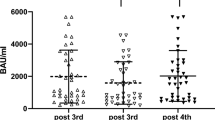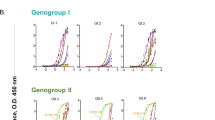Abstract
Sensitivity to human encephalitogenic factor (EF) was measured in 70 cancer patients, in 34 patients with various non-malignant diseases and in 18 healthy volunteers, using the macrophage migration inhibition (MMI) test. Sensitization was demonstrated in 44/70 (63%) of the cancer patients, in 11/34 (32%) of the patients with non-malignant conditions and in one (5%) of the healthy individuals. No significant difference was seen in the frequency of demonstrable sensitivity with clinical stage of disease in cancer patients.
Autologous serum from cancer patients had the ability to abrogate EF-mediated migration inhibition in 22/30 sensitized individuals. This blocking occurred with a similar frequency in all 3 clinical stages of cancer. Autologous serum from patients with non-malignant disease caused abrogation of EF-mediated migration inhibition in 4/11 sensitized individuals, whilst none of the healthy control individuals showed any significant change in the migration index in the presence of autologous serum. Homologous serum from patients with carcinoma of the breast or lung with and without autologous blocking activity and serum from a healthy individual were tested against lymphocytes from patients with various tumour types with the MMI test. Of 11 patients tested in the absence of serum, 8 (73%) showed significant migration inhibition with EF, whilst serum from patients with carcinoma of the lung or breast with autologous blocking activity abolished migration inhibition with EF in all 8 individuals with the former and in 6 with the latter, regardless of the tumour type from which the lymphocytes under test were derived. Homologous serum from both a carcinoma of the lung and breast without autologous blocking activity did not abolish migration inhibition with EF, except with the latter in one patient with a carcinoma of the lung.
This is a preview of subscription content, access via your institution
Access options
Subscribe to this journal
Receive 24 print issues and online access
$259.00 per year
only $10.79 per issue
Buy this article
- Purchase on Springer Link
- Instant access to full article PDF
Prices may be subject to local taxes which are calculated during checkout
Similar content being viewed by others
Rights and permissions
About this article
Cite this article
Flavell, D., Potter, C. Cellular Immunity to Encephalitogenic Factor in Man as Measured by the Macrophage Migration Inhibition Test: The Effects of Serum. Br J Cancer 37, 15–22 (1978). https://doi.org/10.1038/bjc.1978.2
Issue Date:
DOI: https://doi.org/10.1038/bjc.1978.2
This article is cited by
-
On the mechanism of binding of human lymphocyte products to guinea pig macrophages
Cell Biophysics (1979)



